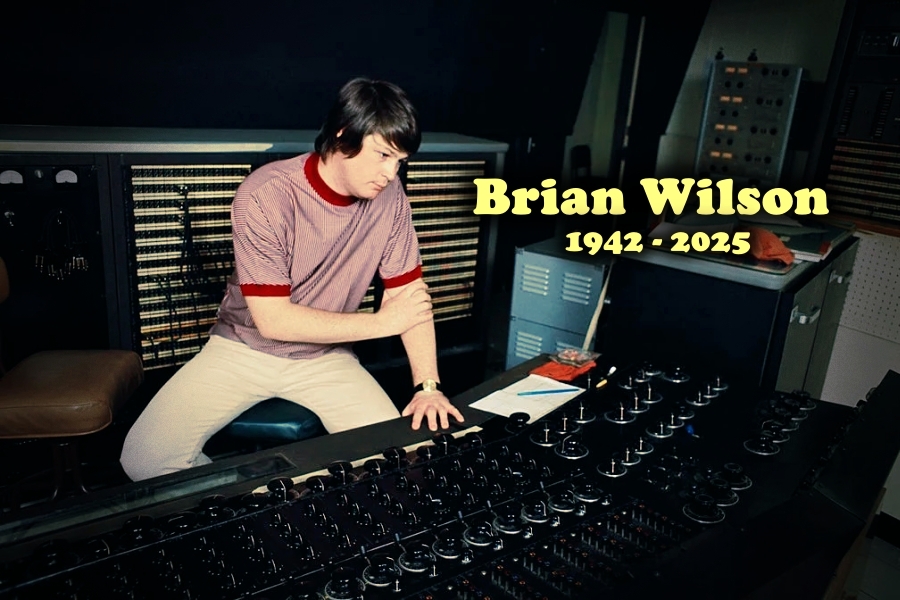I’ve never been big on nostalgia, but I can’t think about my childhood without hearing The Beach Boys. Every memory is sun-drenched and scored by their sound. Closing my eyes, I can flash back to my Dad waxing his pickup in the shade of the backyard while listening to Chicago’s oldies station, WJMK 104.3. Brian Wilson, the band’s visionary heart, didn’t just write the soundtrack to the youth of my summers; he captured the feeling of summer itself. Maybe not just for me, but for everyone.
Long before the music press coined terms like “baroque pop” or “psychedelia,” Brian Wilson was already hearing symphonies in his head.
Raised in Hawthorne, a working-class pocket of L.A.’s aerospace sprawl, Brian was obsessed with the jazz chords of The Four Freshmen, the American pastoralism of Gershwin, the streetcorner swoon of doo-wop, and of course, rock n’ roll. He wasn’t just learning music; he was inhaling it. But he was also learning fear. His father, Murry Wilson, was a failed songwriter and a domineering figure whose abuse cast a long shadow over Wilson’s psyche. The Beach Boys may have started as a family affair, but Brian had already begun retreating into himself by the time the band hit national airwaves.

Behind the shiny veneer of surfboards and soda fountains, Wilson was cracking open pop music’s ribcage. Lyrically, songs like “I Get Around” and “California Girls” weren’t much different than any other chart fodder of the early ’60s. But production-wise, they were 3-minute marvels, stitched together with harmonies that defied logic. With arrangements that seemed to tap directly into some unreachable emotional core. He was pulling from jazz, girl groups, Chuck Berry, even classical structures, and blending them into something utterly American, utterly new.
At just 24, fresh off a nervous breakdown and done with touring, Wilson poured everything into what would become a quiet revolution. The emotional exorcism known as Pet Sounds.
Thirteen songs of orchestrated melancholy, arranged with the Wrecking Crew, a team of elite L.A. session musicians, and layered with the aching poetry of lyricist Tony Asher. It was the sound of existential aches and youth slipping away.
While Pet Sounds slowly gained its due, Wilson pushed further with its follow-up single. “Good Vibrations” became his Frankenstein masterpiece: 90 hours of tape, 17 sessions, and a sonic collage that somehow ended up as a perfect pop single. It was transcendent and psychedelic. It was pure Wilson.
In his later years, Brian Wilson’s life was marked by a mix of struggle and grace. Fading out of the public eye, toxic conservatorships, lawsuits, and failed projects. Ongoing health issues cast long shadows, but there were still moments of light. His second marriage brought him stability and love, and together they built an extended family that gave his life new meaning. He continued to find joy onstage during select live shows and short tours, where fans welcomed him with reverence and warmth. On June 11, 2025, Wilson’s family announced on his website that he had passed away peacefully. A quiet exit for a man whose music once roared with the sound of heaven trying to break through.
For me, Brian Wilson’s music didn’t just shape my taste; it reshaped how I understood what pop music could be.
If it wasn’t the lush production or studio wizardry, it was the way he built songs from the inside out. Crafting every note and harmony with emotional intent. Every time I’ve stepped into a recording studio, I’ve done it with Brian in mind. Whether I’m workshopping, tracking, or performing, I’m always asking myself: What would Brian Wilson do? When I had the opportunity to see Brian perform Pet Sounds in its entirety at Pitchfork Music Festival 2016, my brain wanted to see if it could be done in a live setting, while my heart struggled with hearing one of my all-time favorite records in person.

Pet Sounds was the first pop album that hit me on a level I didn’t fully understand. I’m not sure if it was just intellectually, emotionally, or subconsciously. Brian could lace a simple hook with pieces of his soul. Beneath the surfboards and sunshine, there was always something deeper, like anxiety, insecurity, and impostor syndrome. Most importantly, the haunting ache for lost innocence.
The music of Brian Wilson was never really just about summer after all. It was about survival, about holding onto youth in a world that never stopped changing.
The voice of Brian Wilson may have faded, but the music still shimmered. He didn’t just craft pop songs; he turned pain into harmony. Brian Wilson showed us that beneath the summer fun and pretty melodies, there were breakdowns and sorrow. At his best, he made music that felt like innocence dying in slow motion. Gorgeous, tragic, euphoric, it was the soundtrack of a soul trying to make peace with the noise inside. And amid all that sadness was a quiet, stubborn beauty.

For more information on the life and times of Brian Wilson, please visit brianwilson.com


